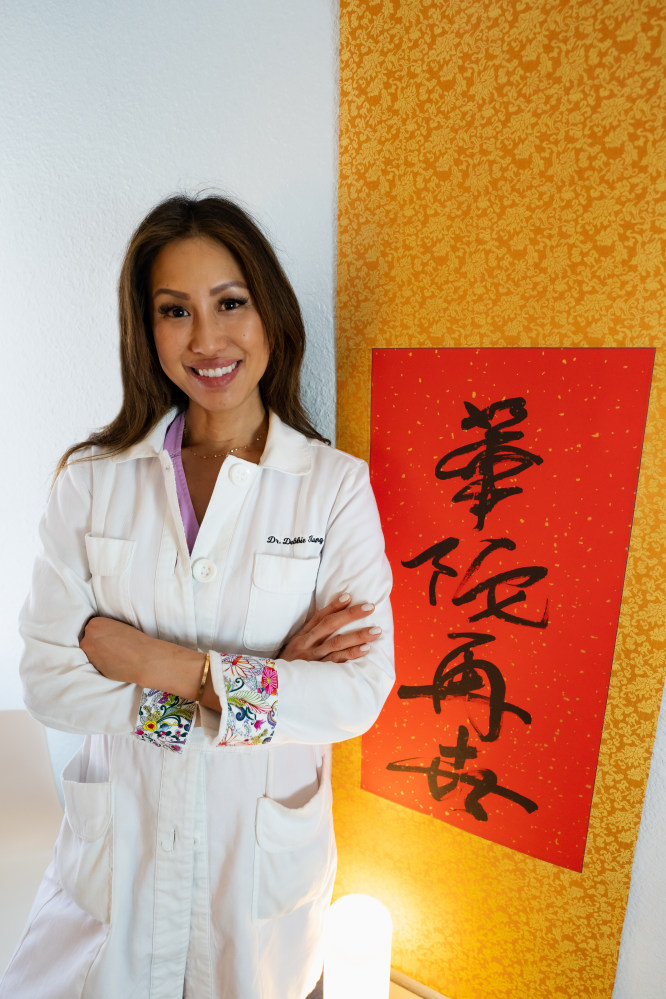
Traditional Chinese medicine brought this healer closer to her culture – now she’s raising awareness of TCM techniques like guasha, a TikTok favourite
- TCM practitioner Debbie Kung spent her childhood trying to fit in with her friends in the United States and ‘didn’t think much about being Asian’
- She discovered Chinese medicine while working with designer Diane von Furstenberg – acupuncture left her glowing and set her on a different path in life
Debbie Kung, a healer and traditional Chinese medicine (TCM) practitioner in the United States, sometimes gives her American patients advice that surprises them. She doesn’t always advocate doing more exercise, for example, and says the health drinks pushed by other wellness practitioners are not as good for your body as you would think.
“I really had denied my culture,” she explains in a video interview from Austin, Texas, where she has a thriving practice. “My family had wanted us to fit in with our American friends, and I didn’t think much about being Asian.”
Kung, whose parents moved from Taipei to the US state of Virginia when she was five, ended up stumbling across Chinese medicine the same way many of her patients do – almost purely by chance.

“It was very competitive,” she recalls. “I decided I would stop self-medicating with wine, and would try something that has been in my culture for thousands of years. It changed my life. The next morning, Diane said to me: ‘You look amazing, did you get a facial?’ I was glowing. It raised a lot of questions for me – how does this work, and how does randomly putting needles in you help press a reset button?”
As a result, Kung switched career paths – she left New York and fashion, and moved to Austin to study a master’s degree in acupuncture.
“It helped provide a great way of looking at the world,” she says. “It makes us think about the human body and how we respond to things. I saw how, after a few sessions, cupping or acupuncture could change someone, could bring the light back into their eyes, could take away their pain. It treats the entire body – not just a migraine or IBS [irritable bowel syndrome].”
Kung started her practice in 2014, but after a couple of years she was diagnosed with thyroid cancer – a glaring sign to her that, despite her ability to care for those around her, she was neglecting herself. She briefly stopped practising and moved to Taipei to let her family take care of her.

“It was a crash course in self-care,” she says. “I used Chinese herbs, and had a Chinese diet. There’s a time for Western medicine, and a time for Eastern medicine. For me, the healing part is Eastern medicine, for getting the body back to where it needs to be.”
After she made a full recovery, she returned to the US and relaunched her practice. Many of her patients are new to Chinese medicine, and she often spends most of a first appointment educating them on TCM.
“For some people, this is usually the last resort,” she said. “Often, we turn to Chinese medicine when nothing else works. The body does respond to this treatment. It’s a beautiful medicine, natural and safe, and it stays with you.”

Kung is also known for guasha – where a small, smooth implement is run along the skin for pain relief and aesthetic reasons. She has seen the technique, popular on social media, performed wrong far too many times, which is why she is planning an online workshop at the end of September where people can learn how to perform it safely and effectively.
“I want to say to them, ‘What are you doing?’ Our skin is elastic. That repetitive pulling motion will age it and not help it. There’s a lot it can’t do – it’s not going to get rid of a double chin or dark circles.”

Kung applies that ruthlessly honest approach to her clients too, even if it’s not what they want to hear or it means telling them that extreme sports or over-exercising is not the TCM way.
“Modern-day society is all about going hard and going strong. Even in Asia, it’s all about working out hard, playing hard. But we have to remember something: our lives are like seasons of the year,” she says. “If we use up all that precious life energy early on, it’s hard to have the most fruitful and best years of our life later.”

